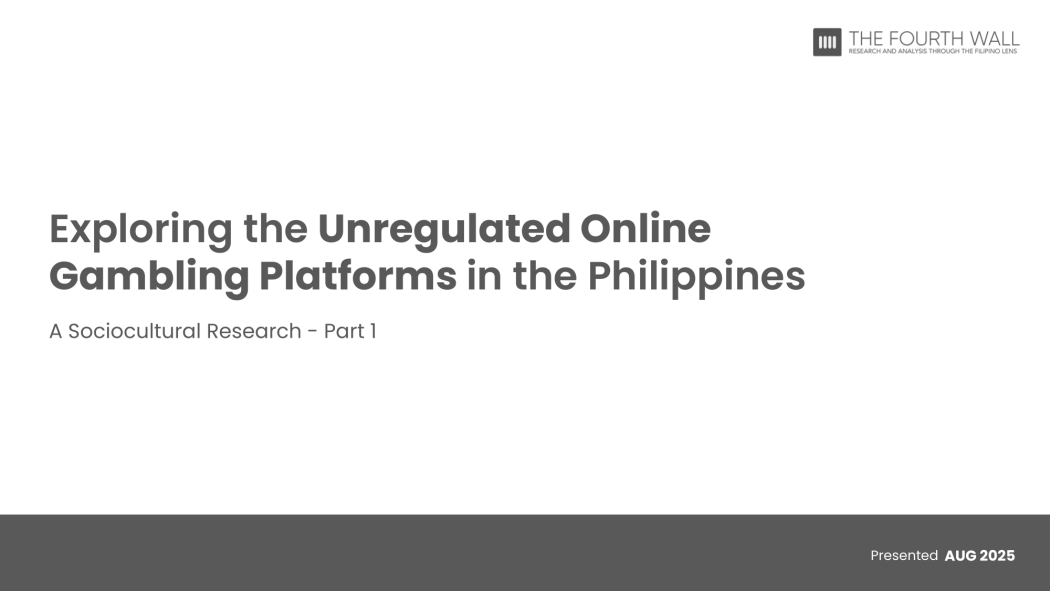
A new study from Filipino-focused sociocultural research firm The Fourth Wall reveals that online cockfighting, or e-sabong, persists on unregulated gambling platforms despite a nationwide ban.
The report, which examined key operational areas of regulated and unregulated online gaming, highlights how unregulated sites operate outside of the consumer protections and strict protocols mandated by the Philippine Amusement and Gaming Corporation (PAGCOR), creating significant risks for players.
According to its findings, several unregulated gambling platforms continue to host e-sabong events and actively promote the game on platforms like Facebook through dedicated groups and private messages to invite players. The games are sometimes gated by account registration but remain openly promoted, indicating ongoing demand and the resilience of illegal operators.
President Ferdinand Marcos Jr. issued Executive Order No. 9 in December 2022, suspending e-sabong operations nationwide and halting all forms of online, remote, or off-cockpit betting on live cockfighting matches, as well as the live-streaming of such events outside official venues.
E-sabong has come to the spotlight after its sighting during President Marcos’ State of the Nation Address in July, when a congressman was filmed watching a cockfighting livestream.

“Our latest report demonstrates how prohibited games like e-sabong remain easily accessible on unregulated platforms even to high-profile figures, underscoring persistent enforcement challenges,” John Brylle L. Bae, Research Director at The Fourth Wall, said.
Aside from the issue of e-sabong, the report analyzed online gambling platforms across specific operational areas, including game offerings, promotions, affiliate structures, payment channels, Know Your Customer (KYC) procedures, trust and safety, and customer service.
The report closely looked at regulated platforms, including BingoPlus, PlayTime, CasinoPlus, ArenaPlus, Bet88, OKBet, and 747 Live, and unregulated platforms such as PHDream, PHFun, PH365, Betso88, 1xBet, Jili77, and OkeBet.
According to the study, unregulated platforms offer an average of approximately 5,000 games, 72% more than regulated platforms, which offer around 2,900 games. Unlike regulated platforms, which must secure approval from PAGCOR and submit games for third-party auditing, unregulated sites release games without any verification, exposing players to potentially fake or manipulated content.
Player verification also distinguishes between regulated and unregulated platforms. Regulated platforms are covered by PAGCOR’s stricter protocols, which include a PAGCOR-branded pop-up upon player signup for eligibility verification. This process requires valid government IDs, age checks, and sometimes cross-checks with e-wallet registration details.
In contrast, KYC requirements are often minimal or absent on unregulated platforms, with some sites only requiring a phone number or email to register. This lack of oversight has seen cases of minors participating on unregulated platforms, some of whom shared stories of incurring debts, falling victim to scams and fraud, and facing privacy issues from spam texts.
In addition, payment systems diverge significantly. Regulated platforms support popular e-wallets such as GCash, Maya, QRPH, and bank transfers, but they cap transactions to comply with anti-money laundering policies. Unregulated platforms, however, allow payments with no transaction limits, which can lead to excessive losses for players.
Trust and safety sharply contrast between the two categories. Regulated platforms verify games and provide formal complaint channels with PAGCOR escalation, whereas unregulated sites often have inconsistent dispute resolution and are frequently linked to scams, phishing risks, and fake game listings.
The platforms’ marketing tactics also reveal key differences. Regulated platforms offer sign-up bonuses and occasional rebates, but their promotions are limited to 10% to 40%. In contrast, unregulated platforms entice players with much higher-value bonuses of up to 108%, along with frequent new player promotions and cashbacks that exceed those of their regulated counterparts.
Additionally, affiliate programs highlight a significant disparity in strategy and oversight. Many unregulated operators run highly lucrative affiliate programs, sometimes offering 45% to 65% of Gross Gaming Revenue (GGR) to attract agents. Regulated platforms, however, offer lower commission rates, typically ranging from 30% to 40%, and provide clear qualification and payment structures.
“Our report shows that the operational differences between regulated and unregulated platforms do not just define how platforms function, but also shape the risks and potential harms players face, especially in unregulated spaces. The absence of safeguards in unregulated platforms highlights the need for targeted enforcement and public awareness,” Bae added.
To get full access to the report, you may visit www.fourthwallglobal.com/phgambcomp or follow The Fourth Wall’s LinkedIn page.

